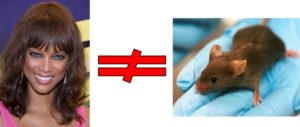We all get that same question over and over again from everyone we meet — the old friend at the grocery store, an uncle at a family reunion, or even a stranger at the bus stop: “What do you do for a living?” If you’re a graduate student, you could be tempted to say something like, “I am a Ph. D student conducting research on the genetics of cancer. Specifically, I study the role of an RNA-binding protein in regulating tumor angiogenesis in both cells and mouse models, and I hope to eventually develop a therapy targeting this molecular pathway.” It’s likely, however, that an answer like this would mean something entirely different to the person who asked you the question than it does to you. Inigo Montoya would probably not be impressed. Why? Because if you look closely at the words in bold, you will realize that while most of them are not particularly complex or technical, they do have very specific meanings in a scientific context. As Ph. D students, it can be challenging for us to remember that many of the words we freely toss around every day in the lab mean something completely different to those that are not actively engaged in science.

Here are just a few of those words that have completely changed in their meaning for me during my time as a scientist. (Just a disclaimer, my Now definitions are far from comprehensive, but instead represent what first comes to my mind now as a Ph. D student in cancer biology).
Ph. D Student
What I used to think: An insanely intelligent human being who has the answers to all of life’s questions and is nothing short of a walking, talking encyclopedia.
Now: Someone who has absolutely no clue what’s going on at any given time of the day.
Research
What I used to think: Reading up on a topic on Wikipedia.
Now: Slaving away for hours at a bench, repeating experiments over and over again that never work, all while questioning the reason for my existence.
Genetics
What I used to think: The field that studies how you inherit traits from your parents.
Now: The field that studies the complex molecular underpinnings of diseases and biological processes at the DNA, RNA, and protein levels.
DNA/RNA
What I used to think: The stuff that determines what color your eyes are and whether or not you have attached earlobes.
Now: Enigmatic molecules we’ve been studying for almost 150 years and have only scratched the surface of in terms of our understanding. Among many things, they are molecules essential for controlling the amount and types of proteins found in a given cell.
Protein
What I used to think: That stuff in meat you should eat a lot of if you want to get buff.
Now: Complex molecules that are the core machinery for all biological processes and functions. When developing new treatments for diseases, these molecules are often what we try to target.
Model
What I used to think: Tyra Banks.
Now: A mouse, fly, worm, frog, fish, or other critter whose genetics, tissues, or other aspect of their biology has been altered to try and mimic a human disease. We use these models to both better understand diseases and test potential treatments for them. Unfortunately, however, these models often fail to capture the full complexity of a given human disease, causing the conclusions we draw from working with them to have shortcomings. This is largely the reason why we have not yet completely cured diseases like cancer!
Therapy
What I used to think: Something you seek out if you are experiencing problems in your life.
Now: A molecule, compound, or technique that targets a specific component of a disease to prevent or eradicate it.
Pathway
What I used to think: The yellow brick road.
Now: A series of molecules (i.e. proteins, DNA, or RNA molecules) that physically interact with or signal to one another to initiate a process or carry out a function.
So next time someone asks you about your research, instead of just trying to simplify your explanation, take the time to teach them the new meaning of a word or two!
Peer edited by JoEllen McBride.
Follow us on social media and never miss an article: